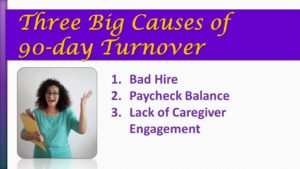By Stephen Tweed
Last week, I shared with you the results of our Home Care CEO Forum Mastermind Member Survey of hot topics. The topic that was on top if the list by a significant marking was … Improving 90-day Retention.
We’ve done a huge amount of research into caregiver recruiting and retention over the past few years. It began in 2017 when I wrote my latest book, Conquering the Crisis: Proven Solutions for Caregiver Recruiting and Retention. At that time, we developed a seven step process for finding and keeping top talent among caregivers. In 2020, we did more research as part of a program called Caregiver Quality Assurance, and organized a CQA Mastermind Group.
From a sneak preview of data from the 2022 Home Care Pulse Benchmarking Study, we know that turnover in 2021 was 64%, very close to the 65.2% in 2020. As a matter of fact, turnover has been flat over the past five years, hovering in the mid 60’s. We also learned that 57% of turnover happens in the first 90 days. This is a more precise number that we had received several years ago when Home Care Pulse indicated that as much as 80% of turnover happens in the first 90 days.
Improving 90-Day Retention
We have done significant research over the past two years to learn more about the factors that affect our ability to find and keep caregivers. One of the areas we have explore deeply is 90-day retention. For example, we have uncovered the three big causes of 90-day turnover: 
- Bad Hire – too many companies are not doing an effective job of selection, and those bad hires usually turnover in the first few weeks.
- Paycheck Balance – Most caregivers fall into a category we call “Economically Fragile.” They have specific financial needs to meet their monthly expenses, and if their take-home pay doesn’t meet those needs, they look for work elsewhere.
- Lack of Engagement – New hires are often left out there alone without anyone to talk with and to encourage them. If they don’t feel connected to their supervisor or their company, they often drift away. Our 2019 Best Caregiver Study showed that caregivers will stay with a company when they are doing meaningful work, when they feel valued and appreciated by their clients, when they feel valued and appreciated by their supervisor, and when they feel fairly paid.
Step Number One – Make Better Hires
In the crunch to get more caregivers, many home care companies have reduced their hiring standards, and have become less effective with their caregiver selection system. The result is that majority of people you hire do not make it through the first 90 days, and according to Home Care Pulse, it costs about $2,600.00 for each bad hire you make. If you have 100 caregivers in your organization, the data suggest that you will lose 64 of them in the first year. Sixty four times $2,600 is $166,400.
What if you were more selective and made better hires? How much less stressful would that be for your recruiter? How much less stressful would that be for your schedulers? How much less frustrating would that be for your clients and their families who have do deal with constant caregiver turnover?
We are seeing that when home care companies are more selective in their hiring, and do more to retain those new hires during the first 90 days, retention improves, clients are happier, and schedulers are less stressed. And, you have all those lost dollars to invest in other parts of your business like recruiting higher quality applicants.
Three Types of Interviews
Our research has helped us identify three specific types of interviews that you may consider as part of your selection system.
- The Culture Fit Interview – We are finding that crafting your company culture is a key ingredient to scaling your home care business. Hiring caregivers whose values are in alignment with your company values is an important part of that process.
- The Job Fit Interview – Designing interview questions to determine whether an applicant is a good fit for the job of being a caregiver is really important. We see many applicants who think being a caregivers would be fun, but when they get on the job they find out it is not for them. Crafting an interview that really digs into the work ethic and core competencies of the applicant, and analyzing the type of work they have done in the past will help determine if they are a good fit for the job.
- The Skills Fit Interview – This is an interview process that determines the level of caregivers job skills that the applicants possess. We’ve found that too many companies spend too much time looking at Job Fit, and not enough time looking at Culture Fit. Our mantra is, “Hire for Attitude, Train for Skills.” If you have an applicant with the right values and attitudes, you can teach them the skills they need to be a great caregiver.
Discuss Your Selection System with your peers
One way to improve any of the systems related to caregiver recruiting and retention is to discuss these processes in detail with other owners of similar sized home care companies. You can do that on a regular basis by being part of the Home Care CEO Mastermind Group. If you would like to explore this option, click the button below:






